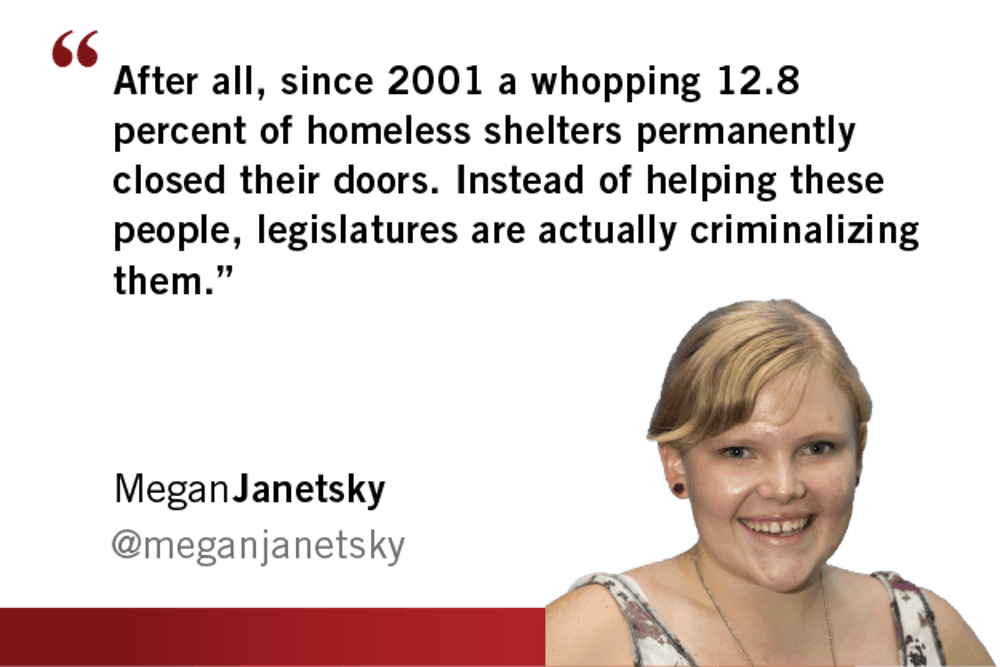"One of the police officers said, 'Drop that plate right now,' as if I were carrying a weapon,” 90-year-old veteran Arnold Abbot said to a Florida news station as he described being arrested for, of all the shameful things in the world, feeding the homeless.
On Nov. 2, officers arrested Abbot and church ministers Dwayne Black and Mark Sims in Fort Lauderdale, Florida, under a recently passed law that places heavy restrictions on feeding the homeless.
The law states “feeding sites” must be 500 feet away from residential properties, and cannot be within 500 feet of each other. It also states that such outdoor programs need special permission and private portable toilets for workers and the people they are feeding. The legislation mandates a punishment of 60 days in jail and a $500 fine for a violation.
This despicable piece of legislation is by no means the only anti-homeless law put in place by legislatures. In the past year alone, 53 cities placed similar restrictions on handing out free food.
 Tempe, for instance, instituted a law in spring 2013 cracking down on panhandling and begging, threatening six months in jail and fines as high as $2,500. Phoenix, which up until recently has had a similar law, repealed its legislation after it was declared unconstitutional, because apparently constitutional rights extend to homeless people as well. Who knew?
Tempe, for instance, instituted a law in spring 2013 cracking down on panhandling and begging, threatening six months in jail and fines as high as $2,500. Phoenix, which up until recently has had a similar law, repealed its legislation after it was declared unconstitutional, because apparently constitutional rights extend to homeless people as well. Who knew?
Even more than that, in 100 cities today, it’s illegal to sit or lie in public spaces. In 81 cities, it’s illegal to sleep in your car, resulting in a $1,000 fine or up to six months in jail. These statistics also jumped noticeably in the past three years.
Basically, we’re slowly making it illegal to be homeless.
A study from the National Law Center on Homelessness and Poverty that tracked the increase in frequency of these laws found that they were both expensive and ineffective, making only the tiniest dent in homelessness rates. Rather, such legislation made it harder for Americans without homes to, well, exist.
Continuing to put in place restrictive and costly laws like this may also cause states to further redirect their efforts. After all, since 2001 a whopping 12.8 percent of homeless shelters permanently closed their doors. Instead of helping these people, legislatures are actually criminalizing them.
It seems that the suffering of these people is ruining the perfect storybook image that state governments are trying so hard to project.
When it boils down to it, however, hiding poverty behind a proverbial curtain will only have a negative effect: further isolating and dehumanizing the impoverished while simultaneously pouring money and resources into laws bound for failure.
Even in its early stages, Fort Lauderdale’s new ordinance is slowly crumbling. A mere three days after their arrest, the three men got on the streets and resumed their “illegal activity.” Likewise, members of the community began to fight the law, joining the movement of feeding the homeless in a public setting.
Unfortunately, this is one of the few communities that actually fought the law. Many others simply accepted it, probably due to the enormous social stigma surrounding homelessness and poverty in general.
While people like Abbot fight the dehumanization by combating these laws, the issues go hand-in-hand. Laws like this will always exist as long as legislatures and citizens view homeless people as merely “hobos” and not actual human beings.
Reach the columnist at mjanetsk@asu.edu or follow her on Twitter @meganjanetsky
Editor’s note: The opinions presented in this column are the author’s and do not imply any endorsement from The State Press or its editors.
Want to join the conversation? Send an email to opiniondesk.statepress@gmail.com. Keep letters under 300 words and be sure to include your university affiliation. Anonymity will not be granted.
Like The State Press on Facebook and follow @statepress on Twitter.




